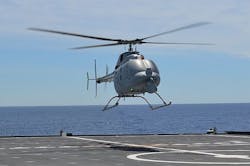Northrop Grumman installing Leonardo surface-search radar on Navy MQ-8C unmanned helicopter
Officials of the Naval Air Systems Command at Patuxent River Naval Air Station, Md., announced a $15.2 million order Monday to the Northrop Grumman Aerospace Systems segment in San Diego to continue installing the AN/ZPY-8A/N radar Osprey MM radar, built by Leonardo MW Ltd. in Edinburgh, Scotland, aboard the Navy MQ-8C fleet.
Northrop Grumman is the designer and systems integrator of the MQ-8C Fire Scout, an unmanned version of the Bell 407 helicopter from Bell Helicopter Textron Inc. in Fort Worth, Texas. Northrop Grumman also received a $32.9 million order last May to install the Leonardo AN/ZPY-8A/N radar aboard Navy MQ-8C UAVs. Monday's order includes the initial radar A-kit installations into the MQ-8C Fire Scout fleet, as well as non-recurring engineering.
This order is part of the MQ-8C Fire Scout radar Original Equipment Manufacturer (OEM) program. The Navy chose Leonardo MW Ltd. to provide the MQ-8C radar in fall 2016. Leonardo MW is an arm of the Leonardo-Finmeccania corporation in Rome, which oversees the company's aerospace, defence and security operations in the United Kingdom.
Related: RDRTec to develop sense-and-avoid radar for Fire Scout and Triton unmanned aircraft
The long-range MQ-8C will fly from the decks of destroyers and other naval surface warships to extend the surveillance and reconnaissance range of the Navy's surface fleet that are operating away from aircraft carriers and land-based aircraft. The manned version of the Bell 407 seats seven, can carry a useful load of 2,347 pounds, flies as fast as 140 knots, and has a range of 324 nautical miles.
The Leonardo Osprey MM is a multi-mode surveillance radar for helicopters and fixed-wing aircraft that provides second-generation active electronically scanned array (AESA) surveillance capability. It brings together wide-azimuth and -elevation electronically scanned fixed antennas with a compact radar signal processor and multi-channel receiver.
Employing high-frequency radio waves, an Osprey-equipped MQ-8C Fire Scout can detect targets at long ranges, at night, and in poor visibility to detect distant threats.
The small-size Osprey MM provides high-performance sea surveillance against difficult targets, as well as land surveillance with wide-swath high-resolution ground mapping, small and low-speed ground target indication, air-to-air surveillance, tracking, and intercept. It can interleave modes rapidly and provide scan-independent beam steering.
Related: Raytheon to upgrade Fire Scout UAV control system with open-systems software
Osprey MM comes with a variety of antenna sizes, depending on the azimuth coverage to facilitate the MQ-8C's operation to and from unprepared surfaces. It offers persistent surveillance and target detection from high altitudes to enhance MQ-8C fuel efficiency.
Osprey MM’s flexible configuration, with antenna size and installation options, its low SWaP, air cooled line replaceable units (LRU), and its open standard interfaces all simplify its integration. At the core of the Osprey MM’s AESA radar design is its ability to tolerate individual element failure. It offers reduced maintenance.
On Monday's order Northrop Grumman will do the work in Fort Worth, Texas; Ozark, Ala.; San Diego and Santa Clarita, Calif.; and Edinburgh, Scotland, and should be finished by May 2020.
For more information contact Northrop Grumman Aerospace Systems online at www.northropgrumman.com, Leonardo MW Ltd. at www.uk.leonardocompany.com, or Naval Air Systems Command at www.navair.navy.mil.
Ready to make a purchase? Search the Military & Aerospace Electronics Buyer's Guide for companies, new products, press releases, and videos
About the Author
John Keller
Editor-in-Chief
John Keller is the Editor-in-Chief, Military & Aerospace Electronics Magazine--provides extensive coverage and analysis of enabling electronics and optoelectronic technologies in military, space and commercial aviation applications. John has been a member of the Military & Aerospace Electronics staff since 1989 and chief editor since 1995.
